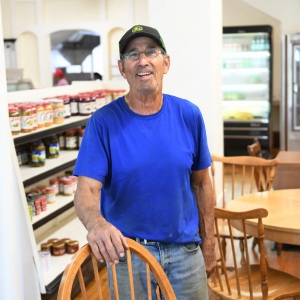Advocates discuss legislative remedies amid growing housing instability
| Published: 05-30-2025 2:57 PM |
HOLYOKE — Standing before more than 150 elected officials, housing advocates and other western Massachusetts leaders, Gerry McCafferty shared some shocking statistics.
McCafferty, director of housing for the city of Springfield and administrator for the Springfield-Hampden Continuum of Care, told the crowd at Holyoke Community College on Friday Morning that there are four times as many unsheltered people in the region this year than there were in 2021 — a staggering 318 individuals without any kind of shelter.
The population recognized as homeless was even larger as of January of this year, with a total 3,560 people in the western part of the state experiencing homelessness. These figures are what galvanized advocates and officials alike to gather for the ninth annual Western Massachusetts Network to End Homelessness gathering, which focused on bold leadership and change in the face of growing housing instability.
One of the key issues addressed at the gathering was a sharp increase in rental rates in recent years, leaving many renters scrambling to keep up with expenses, stay in the communities they are a part of and avoid being pushed out of their homes altogether.
“Rents have spiked considerably since COVID,” McCafferty said, explaining that in Hampshire, Franklin and Hampden counties, rent is up 32.5% since 2021. Citing studies by the Harvard Joint Center for Housing Studies, McCafferty added that throughout the region, 54% of renters are cost-burdened, meaning that they pay more than 30% of their income in rent. Of those renters, 32% pay more than 50% of their income in rent.
Following that trend in rent increases, evictions also have risen, as McCafferty pointed out. Eviction filings rose 52% between 2023 and 2024, and 66% between 2022 and 2024.
Nancy Dorian, a 67-year-old Easthampton resident who spoke at the gathering, knows these trends intimately.
Upon returning to the Valley in 2022 after taking her artistic career on the road, Dorian found that rents had increased in her time away. It came as a relief when she found an “affordable” place to live at Pleasant View Apartments in Easthampton, a 33-unit complex.
Article continues after...
Yesterday's Most Read Articles
 ‘We’re trying a new adventure’: International Cafe and Deli opens in South Deerfield
‘We’re trying a new adventure’: International Cafe and Deli opens in South Deerfield
 My Turn: A rocky road ahead for Stone Farm Lane proposal
My Turn: A rocky road ahead for Stone Farm Lane proposal
 Slew of write-ins elected in Hawley
Slew of write-ins elected in Hawley
 Baseball Roundup: Greenfield’s Caleb Thomas holds Franklin Tech to two hits as Wave advances to Class C semis with 11-1 win
Baseball Roundup: Greenfield’s Caleb Thomas holds Franklin Tech to two hits as Wave advances to Class C semis with 11-1 win
 Gov’s supplemental budget includes $7M for unpaved roads
Gov’s supplemental budget includes $7M for unpaved roads
 22-year-old farmworker airlifted to hospital after tractor accident in Sunderland
22-year-old farmworker airlifted to hospital after tractor accident in Sunderland
But last November, the complex was purchased for $4 million by Pleasantview Residences LLC, according to the Hampshire Registry of Deeds. Dorian was alerted to the change when she came home to find a notice taped to her door.
“This is my introduction to my new new landlords,” she said.
The notice alerted her to a complex-wide, 35% rent increase. For her, it would mean $400 more coming out of her pocket to stay in her apartment. She had less than a month to accept the increase, or leave.
“It was during the holidays in the dead of winter,” she said. “I was in a state of panic.”
She signed the new lease, and her rent now consumes 42% of her income.
Bennita Watford, a member of Neighbor to Neighbor, shared a similar experience.
Watford, a longtime Springfield resident, was living in an apartment owned by what she described as “slum lords,” paying $1,200 a month in rent for unsanitary, unhealthy conditions: a mildew-covered, mouse-infested home opening up to hallways littered with human urine and feces.
One day, she slipped on urine in the hallway, fell, and cracked two of her ribs.
“A painful injury from the very place I was supposed to call home,” she said.
Soon after that, ownership changes at her complex led to rent increases that ultimately forced her out of her home. She has since relocated to Pittsfield.
Using their experiences as fuel for change, both Watford and Dorian urged state legislators in the room to pass a rent stabilization bill titled An Act Enabling Cities and Towns to Stabilize Rents and Protect Tenants (S.1477/H.2328).
“Rent control isn’t a policy,” said Watford. “It’s a lifeline. It’s the difference between a family having a safe place to live versus being pushed out into the streets.”
Rent stabilization was just one area of emphasis during the gathering, as speakers lauded the potential of various bills on Beacon Hill aimed at decriminalizing homelessness, promoting access to counsel for those experiencing housing instability, creating a local option for real estate transfer fees to fund affordable housing, establishing a foreclosure prevention program and more.
As Pamela Schwartz, director of the Western Massachusetts Network to End Homelessness, noted to the crowd, there have been some “meaningful points of progress” when it comes to combating housing insecurity in the commonwealth.
Namely, Schwartz pointed to the passage of the Affordable Homes Act last year, 2,068 people moved from homelessness into permanent housing over the past year and 1,239 units of affordable housing in the pipeline for the region, including 175 units of supportive housing.
However, Schwartz acknowledged that there is still a long way to go.
“Housing ends homelessness,” she said. “We’re building more housing, we need more.”
In western Massachusetts, Schwartz said there is a 19,000 unit affordable housing gap. Statewide, there is a 220,000 housing unit gap and a 10,000 unit supportive housing gap.
Adding to the challenge of filling those gaps is the “attack” by the current federal government administration on housing initiatives, she said.
For example, the Trump administration cut the Department of Housing and Urban Development’s (HUD) budget by 44%, cut the U.S. Interagency Council on Homelessness and “decimated” HUD staff, and is considering a budget reconciliation bill that includes considerable cuts to Medicaid and SNAP.
Jeff Olivet, former executive director of the U.S. Interagency Council on Homelessness and current senior advisor of Harvard’s Chan School of Public Health, also focused on the administration’s move away from a “housing first” model and toward punitive approaches.
“We know that arrests and fines and jail time are not what’s going to solve homelessness,” he said.
He urged those present to stay vigilant and stay positive, so that they may “design what comes from the ashes” when the Trump administration no longer holds power.
“Even the most oppressive regimes die, and this one will too,” he said.
Both Olivet and Schwartz said that local action is the best way to start pushing for federal change.
Expressing similar sentiments, state Rep. Mindy Domb, D-Amherst, encouraged housing advocates to attend public hearings happening in the Legislature to share their expertise and needs, forging a more collaborative, intersectional approach to combating threats to housing stability.
Domb emphasized pushing back against the Trump administration’s policies and cuts, using “banned” words like “equity” and “diversity,” and keeping one’s senses of hope and humor in uncertain times.
“They will fold,” she said of the current administration. “They will fold like a cheap suit.”








 South County Notebook: Aug 17, 2025
South County Notebook: Aug 17, 2025 Mohawk Trail students to see new staff, new codes of conduct upon Aug. 27 return to school
Mohawk Trail students to see new staff, new codes of conduct upon Aug. 27 return to school Grand opening of Buckland-Shelburne Elementary School playground set for Aug. 26
Grand opening of Buckland-Shelburne Elementary School playground set for Aug. 26 Bear-y unwelcome: Why MassWildlife says it’s time to ‘break up’ with bird feeders
Bear-y unwelcome: Why MassWildlife says it’s time to ‘break up’ with bird feeders
